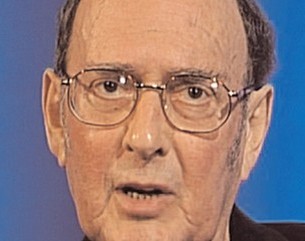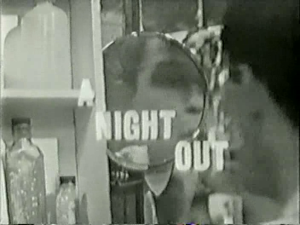This article has multiple issues. Please help improve it or discuss these issues on the talk page . (Learn how and when to remove these template messages)
|
Victoria Station is a short play for two actors by the English playwright Harold Pinter.
This article has multiple issues. Please help improve it or discuss these issues on the talk page . (Learn how and when to remove these template messages)
|
Victoria Station is a short play for two actors by the English playwright Harold Pinter.
Victoria Station consists of a radio dialogue between a minicab controller (or dispatcher) and a driver (#274) who is stopped by the side of "a dark park" in Crystal Palace, supposedly waiting further instructions. The stage directions Lights up on office. CONTROLLER sitting at microphone and Lights up on DRIVER in car (45) alternate between these settings.
The controller attempts to instruct the driver to pick up a client from Victoria Station, but the driver declines to move, focusing on his current client (who is apparently unmoving, perhaps even dead, in the back seat). The Controller's mood shifts through various degrees of mystification towards irritation and then possibly compassion masking some more nefarious intention of what to do with this Driver.
Lasting fewer than ten minutes, the play's tone is mostly comic, as the Controller becomes more and more frantic at the Driver's recalcitrance; however, as the play develops, the Controller's orders become increasingly ominous threats: "Drop your passenger. Drop your passenger at his chosen destination and proceed to Victoria Station. Otherwise I'll destroy you bone by bone. I'll suck you in and blow you out in little bubbles. I'll chew your stomach out with my own teeth. I'll eat all the hair off your body. You'll end up looking like a pipe cleaner? Get me?" (58). But Driver reveals that this client is a young female with whom he has "fallen in love" (possibly "for the first time") and from whom he refuses to part, imagining that he will even marry her and that they will "die together in this car", despite the previous admission that he is already married to a wife probably "asleep in bed" and the father of (perhaps) "a little daughter"—"Yes, I think that's what she is" (55).
The play becomes more somber in tone, as the Controller tries to assure the fearfully insecure Driver that all will be fine, finally cajoling him to "stay exactly where" he is, as the Controller prepares to leave "this miserable freezing fucking office"—obsessed in turn by the Driver and the fact that "nobody loves me"—in search of him, saying that he imagines them sharing a holiday together on Barbados (59). In response to the Driver's repeated plea, "Don't leave me" (53–54), the Controller may be prepared to "help" him (as he insists), but one may still wonder if he might actually retain some more menacing possibility (60–62).
It was first performed at the National Theatre, London, on 14 October 1982. The performers were Paul Rogers as the Controller and Martin Jarvis as the Driver. The same cast recorded a radio version for BBC Radio 3, directed by John Tydeman and first transmitted on 15 August 1986.
The sketch is published in Other Places: Three Plays, including also A Kind of Alaska and Family Voices (Grove Press, 1983), and also in Other Places: Four Plays by Harold Pinter (Dramatists Play Service, 1984).
Douglas Hodge directed Robert Glenister and Rufus Sewell in a 15-minute film version, released in 2003 by Alcove Entertainment. [1]
Victoria Station was among the short works included in a 2007 London production entitled Pinter's People , in which Bill Bailey played the minicab controller and Kevin Eldon played the cab driver. [2] According to Benedict Nightingale's mostly negative review of Pinter's People in the Times , Victoria Station (along with Night ), was among the few sketches performed effectively. [3]
Last night I was sickened by some of the coarsest performances I have ever seen in a London playhouse. True, the Haymarket isn't the most intimate of theatres — but does that mean Sean Foley should let members of his cast go so abjectly into steamhammer and/or megaphone mode? … You can just about see Pinter's trademark preoccupations beneath language that's superficially as scattered and random as any you might overhear in a caff or on a bus: paranoia, the urge to dominate, loneliness, the need to fill silences with a sort of meaningful meaninglessness. But only in the second half does the cast calm down and let the audience listen, observe, ponder. With Bailey a justifiably (and credibly) frantic minicab controller and Kevin Eldon as the driver who denies any knowledge of one of London's great termini, Victoria Station comes off fine — and Night pretty well too.

Harold Pinter was a British playwright, screenwriter, director and actor. A Nobel Prize winner, Pinter was one of the most influential modern British dramatists with a writing career that spanned more than 50 years. His best-known plays include The Birthday Party (1957), The Homecoming (1964) and Betrayal (1978), each of which he adapted for the screen. His screenplay adaptations of others' works include The Servant (1963), The Go-Between (1971), The French Lieutenant's Woman (1981), The Trial (1993) and Sleuth (2007). He also directed or acted in radio, stage, television and film productions of his own and others' works.
Mountain Language is a one-act play written by Harold Pinter, first published in The Times Literary Supplement (TLS) on 7–13 October 1988. It was first performed at the Royal National Theatre in London on 20 October 1988 with Michael Gambon and Miranda Richardson. Subsequently, it was published by Faber and Faber (UK) and Grove Press (USA). Mountain Language lasts about 25 minutes in production. It was most recently performed as part of Theatre of Menace (2016) at the Smock Alley Theatre in Dublin, starring Alisa Belonogina, Paul Carmichael, Lana O'Kell, Jaime Peacock, Louis Tappenden and Natasha Ryan
Henry Woolf, was a British actor, theatre director, and teacher of acting, drama, and theatre who lived in Canada. He was a longtime friend and collaborator of 2005 Nobel Laureate Harold Pinter, having stimulated Pinter to write his first play, The Room (1957), in 1956. Woolf served as a faculty member at the University of Saskatchewan from 1983 to 1997 and as artistic director of Shakespeare on the Saskatchewan from 1991 until 2001.

Exiles is James Joyce's only extant play and draws on the story of "The Dead", the final short story in Joyce's story collection Dubliners. The play was rejected by W. B. Yeats for production by the Abbey Theatre. Its first major London performance was in 1970, when Harold Pinter directed it at the Mermaid Theatre.

The Birthday Party (1957) is the first full-length play by Harold Pinter, first published in London by Encore Publishing in 1959. It is one of his best-known and most frequently performed plays.

One for the Road is an overtly political one-act play by Harold Pinter, which premiered at Lyric Studio, Hammersmith, in London, on 13 March 1984, and was first published by Methuen in 1984.
Family Voices is a radio play by Harold Pinter written in 1980 and first broadcast on BBC Radio 3 on 22 January 1981.

The Lover is a 1962 one-act play by Harold Pinter, originally written for television, but subsequently performed on stage. The play contrasts bourgeois domesticity with sexual yearning.

The Homecoming is a two-act play written in 1964 by Harold Pinter and first published in 1965. Its premières in London (1965) and New York (1967) were both directed by Sir Peter Hall. The original Broadway production won the 1967 Tony Award for Best Play. Its 40th-anniversary Broadway production at the Cort Theatre was nominated for a 2008 Tony Award for "Best Revival of a Play".

Awakenings is a 1973 non-fiction book by Oliver Sacks. It recounts the life histories of those who had been victims of the 1920s encephalitis lethargica epidemic. Sacks chronicles his efforts in the late 1960s to help these patients at the Beth Abraham Hospital in the Bronx, New York. The treatment used the new drug L-DOPA, with the observed effects on the patients' symptoms being generally dramatic but temporary.
Pinter's People is a compilation of revue sketches or short prose works by Harold Pinter, which was performed for four weeks from 30 January 2007, at the Haymarket Theatre, in London, starring Bill Bailey, Geraldine McNulty, Sally Phillips, and Kevin Eldon. The show was assembled by Bailey and directed by Sean Foley.

A Night Out is a play written by Harold Pinter in 1959.
Night is a dramatic sketch by the English playwright Harold Pinter, presented as one of eight short dramatic works about marriage in the program Mixed Doubles: An Entertainment on Marriage at the Comedy Theatre, London, on 9 April 1969; directed by Alexander Doré, this production included Nigel Stock as the Man and Pinter's first wife, Vivien Merchant, as the Woman (54). It replaced another sketch performed previously in the program We Who Are About To... at the Hampstead Theatre Club on 6 February 1969; each of the original eight sketches about marriage also featured two characters.
Bibliography for Harold Pinter is a list of selected published primary works, productions, secondary sources, and other resources related to English playwright Harold Pinter (1930–2008), the 2005 Nobel Laureate in Literature, who was also a screenwriter, actor, director, poet, author, and political activist. It lists works by and works about him, and it serves as the Bibliography for the main article on Harold Pinter and for several articles relating to him and his works.
David Hugh Jones was an English stage, television and film director.
A Kind of Alaska is a one-act play written in 1982 by British playwright Harold Pinter.
Sir Michael Victor Codron is a British theatre producer, known for his productions of the early work of Harold Pinter, Christopher Hampton, David Hare, Simon Gray and Tom Stoppard. He has been honoured with a Laurence Olivier Award for Lifetime Achievement, and is a stakeholder and director of the Aldwych Theatre in the West End, London.

The Harold Pinter Theatre, known as the Comedy Theatre until 2011, is a West End theatre, and opened on Panton Street in the City of Westminster, on 15 October 1881, as the Royal Comedy Theatre. It was designed by Thomas Verity and built in just six months in painted (stucco) stone and brick. By 1884 it was known as simply the Comedy Theatre. In the mid-1950s the theatre underwent major reconstruction and re-opened in December 1955; the auditorium remains essentially that of 1881, with three tiers of horseshoe-shaped balconies.
Trouble in the Works (1959) is a comedy sketch by Harold Pinter. The sketch has two characters, Mr. Fibbs and Wills. The play takes place in an office, where Wills has been called into Mr. Fibbs' office to tell him why the workers are unhappy. According to Mr. Fibbs, his workers are treated very well and he can't seem to understand why his workers are so unhappy. Wills explains to him that though the workers are treated well, they have turned against the products that they make. The majority of the rest of the show is the two going back and forth on which products the workers no longer like. At the end, Mr. Fibbs asks what the workers would rather make, and Wills answers, "Brandy balls".